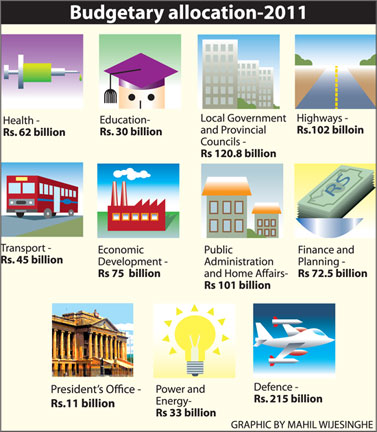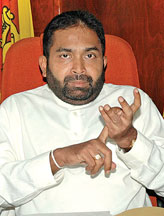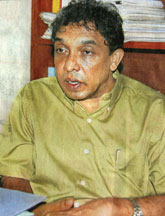|
Battling economic war:
2011 Budget to face fresh challenges
By Lalin FERNANDOPULLE
All attention is on the 2011 Budget. How would it address key
economic issues, meet fresh challenges and boost development in the next
decade?
 The focus of the policy makers, financial experts and the public is
on the economic war, a new battle waged after the end of the 30-year
conflict. The focus of the policy makers, financial experts and the public is
on the economic war, a new battle waged after the end of the 30-year
conflict.
The war which impeded growth and stability in the country is history.
The prime concern now is on achieving sustainable and wholistic
development that would trickle down economic benefits to the masses.
Deputy Minister of Economic Development Ranjith Siyambalapitiya said
that the government has embarked on a massive economic development drive
under the Mahinda Chintana Idiri Dekma program and added that the 2011
Budget will lay the ground to achieve the objective.
Increasing revenue, trimming expenses, tax reforms, creating a
business and investment friendly environment, narrowing the trade
deficit are some of the fundamental issues that policy makers would need
to address in the forthcoming budget.
The import expenditure surpassed earnings from exports widening trade
deficit by 108.6 percent to US$ 2,844 million in the first half 2010,
compared to the corresponding period last year.
“The future vision of the President has mapped out strategies to
double per capita income, slash inflation,reduce unemployment, enhance
foreign investments and boost economic growth in the country”,
Siyambalapitiya said.
Economists and financial experts said the government should cut down
on expenses and focus on widening revenue sources if the country is to
achieve targets in the development program.
“The defence expenditure for 2011 is high and it could be trimmed
down to focus on development. A business and investor friendly culture
is essential to expedite growth in the country” analysts said.
The silver lining however is the host of big-time foreign investors
showing interest in Sri Lanka which includes India’s Mahindra and
Mahindra, the Hong Kong based Shangri-La Hotels and Suchirindia Lankan
Hotels and Resorts signing up to set up a US$ 25 million hotel in
Katunayake.
Siyambalapitiya said there has been sound financial management and
more welfare measures introduced since the President assumed office in
2005.
“The debt to GDP was around 105 percent during 2003/04 but gradually
dropped to around 85 percent in the following years. The debt would be
below 80 percent in the next five years”, he said.
The debt debate continues with no signs of an end as borrowings from
commercial loans increase for projects such as the Hambantota harbour,
airport and other infrastructure development across the country.
Financial experts say that over 40 percent of the government revenue
is used to service interest payments.
 |
 |
| Minister
Siyambalapitiya |
Prof. Sirimal
Abeyratne |
“The government has launched several welfare measures such as the
fertilizer subsidy, low interest rates on borrowing, relief packages for
SMEs and now housing for shanty-dwellers”, the Deputy Minister said.
Rural poverty still remains a major issue to be addressed though
there is an encouraging decline in poverty with time. Less access to
capital and poor infrastructure facilities have resulted in the drop in
household income leading to abject poverty.
Siyambalapitiya said steps have been taken to promote tourism which
is fast becoming the number one revenue earner in the country. Tourist
arrivals have surged since mid last year after the end of the conflict.
The Sri Lanka Tourism Development Authority estimates revenue from
tourism will exceed US$ three billion within the next five years.
Director General, Fiscal Policy, Ministry of Finance, S.R. Attygale
said the 2011 Budget will be supportive of domestic capital formation
which is essential for economic growth.
He said the country’s tax system is not conducive for business and
investments and added that tax reforms are vital to create a good
business environment.
“There should be 35 percent investment to achieve the eight percent
GDP growth rate set by the government. The government can invest about
seven percent and the rest must come from the private sector”, Attygale
said.
The government will provide tax incentives to investors but not on a
large-scale. Tax reforms will be a highlight of the 2011 Budget.
The BOI doesn’t seem to deliver, with little or no major investments
made known over a considerable period of time. Changes to the BOI, the
premier investment promotion body in the country is in the offing.
The BOI had to put on hold investment project proposals in eight
sectors following a directive from the government, until the budget is
presented this month.
The Appropriation Bill for the Budget 2011 was presented last month
and the estimated expenditure for next year is Rs.1,080,967,766,000.
People expect the Budget to bring down the cost of living, create
jobs and more welfare measures.
Professor of Economics University of Colombo, Sirimal Abeyratne said
the 2011 Budget should support the medium-term economic vision of the
government spelt out in the Mahinda Chintana program.
He said the budget should help achieve the eight percent economic
growth rate, doubling of per capita income and increase of investments.
“The budget should address its own fundamental weaknesses which are
deep-rooted and long-standing.
The government revenue is not sufficient to cover recurrent
expenditure. Around 40 percent of the government revenue is used on
interest payments and about 25 percent on subsidies”, Prof. Abeyratne
said.
Senior Lecturer, Faculty of Management and Finance University of
Colombo. Prof. H.D. Karunaratne said the priority of the new budget
should be to develop tourism and other service sectors.
“Steps should be taken to identify key industries and promote them
under the hub concept to drive economic growth”, he said.
He said the 2011 Budget should introduce tax reforms proposed by the
Tax Commission to create a vibrant business and investment climate in
the country.
|

